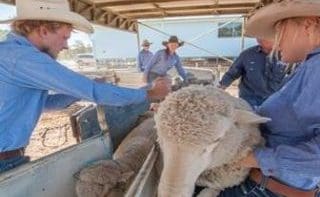Latest listings on Jobs Central recruitment page:
- Livestock Manager, Vic. – via Rimfire Resources
- Livestock Buyer, New England area – via Agricultural Appointments
- Manager, King Island – TRT Pastoral
- Mechanical Fitters – Bindaree Beef Group
- Operations Manager, Canobie Station – AA Co
- Leading Hand + pt Cook/Gardener – Brigodoon Cattle Co
- Territory Manager, Rockhampton – Datamars
- General Manager Sales & Marketing – via Rimfire Resources
- Station Manager, Rocklands – Paraway Pastoral
- Farm Hand/Feedlot Assistant – Tullin Tulla Beef
- Livestock Overseer, Goodar – Cunningham Cattle Co
- Station Hand, Byerwen – Colinta Holdings
- Area Sales Manager SE Tablelands NSW – via Rimfire Resources
- BDM/Sales Manager, Qld&NT – via Agricultural Appointments
- Station Cook, Millungera – Acton Cattle Co
- Head Stockpersons(4) – Hancock Agriculture
- Seedstock Property Manager, Ben Lomond – Palgrove
- Graduate Opportunity, Opal Creek – Australian Country Choice
- Farm Hand + Case Ready Planner + Livestock Planner – Harvey Beef
- Station Cooks (2) – Stanbroke
- CEO/General Manager – Northern Territory Cattlemen Assoc.
- Pastoral Project Officer, Darwin – Territory NRM
- Property Manager, Albro – TVF Pastoral
Click here to access these and other exciting meat and livestock supply chain jobs currently listed on Jobs Central.

THE commencement of a new year is often a time for employers in the agricultural industries to reflect on their future hiring requirements, and for employees, to plan a career move.
For employers and candidates alike, there are implications from operating in a COVID-affected job market. Why? – Because, generally there are more candidates in the market looking for work.
For employers, just because there are more candidates available doesn’t mean that it is any easier to fill a role. For job-seekers, the extra competition and ‘market noise’ created by the increased volume of job searchers means that they may have to sharpen up their approach to job search.
Tips for employers
When unemployment levels rise, you simply get more applications from marginal candidates and many of whom don’t fulfil the selection criteria. More candidates applying means more time is required to scrutinise resumes.
Just because there are a lot of people on the market doesn’t mean the talent pool is any deeper. Employers will always be focused on retaining superior performers, so to hire such quality candidates, you need to first understand, and then satisfy their needs.
Good candidates in good jobs are less likely to apply for jobs elsewhere in uncertain times, because they are reluctant to take on the risk of a new job in a changing environment.
The danger of hiring over-qualified candidates. Personnel made redundant in COVID-affected industries may accept more junior roles than they would have previously considered and thus may seek to return to more senior roles when conditions improve.
So, while candidate numbers may increase, employers may really need to work harder on the development of their recruitment strategies than they might otherwise suppose.
Tips for job applicants
For job applicants, the problems they encounter are the outcome of the employers’ dilemma: That is, a lot of candidates applying for roles they wouldn’t normally apply for, means that individuals have to work harder to stand out.
Suitable strategies for job seekers in tough times include:
- Review your current resume and seek advice on how to improve it. Make sure it is up to date and accurate. Remember your resume is a marketing document; it must be comprehensive yet easy to read and digest. No resume should be over six pages and anything less than three is a bit slim.
- Ensure that your cover letter and resume is clearly focused on the position you are applying for. A purpose written cover letter will assist in highlighting your skills and experience which are relevant to the selection criteria.
- Be realistic, make sure what you are applying for is aligned with what you have to offer. Firing off resumes in every direction can make you look desperate and only invites disappointment.
- Develop relationships with recruitment firms that specialise in your industry and remember it is a two-way street. Be realistic about what agencies can do for you, they can only place you in roles that they have available.
- Be patient, polite and help others.
Source: Agricultural Appointments

HAVE YOUR SAY